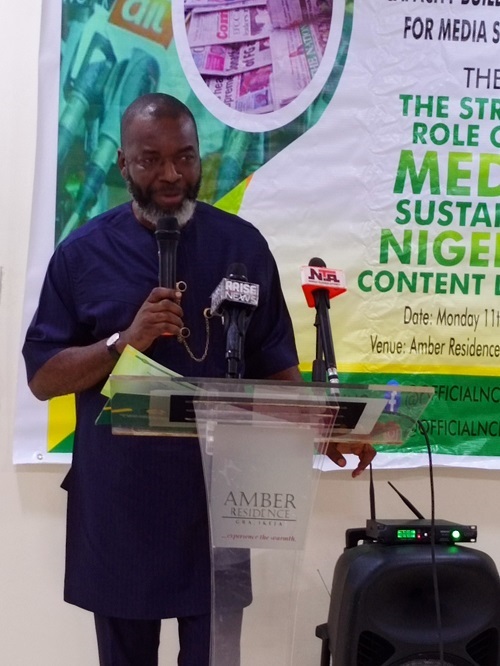Mr. Esueme Dan Kikile, Manager, Corporate communication, NCDMB
…Training gives tips on essential etiquettes and ethics of media career
The Nigeria Content Development and Monitoring Board (NCDMB), trained energy reporters and urged the media to continue to ensure Local Content achievements of the Board are sustained especially the legacies of the immediate past Executive Secretary, Engr. Simbi Kesiye Wabote.
Esueme Dan Kikile, Manager, Corporate communication, NCDMB, made the call at the capacity building workshop organised for the media in Lagos on Monday.
Speaking on the theme, “The strategic role of the media in sustaining Nigeria Content Legacies”, Kikile noted that the call was even more timely as the Board goes through a transition period.
Kikile was of the view that the media is needed to sustain the development and sustenance of the Local Content gains achieved by the Board.
According to NCDMB Corporate Manager, the Board has achieved “83% level of achievement for its 10-year roadmap.”
He revealed that “The foundation for NCDMB was laid in 2001 when former President Olusegun Obasanjío inaugurated the Presidential Committee on Local Content in the Oil and Gas Industry. He mandated the Nigerian National Petroleum Corporation (NNPC) to drive the policy and set certain targets.
“In its efforts to implement the policy, the national oil company set up the Nigerian Content Division within its system and issued some Nigerian content directives to industry stakeholders.”
In his words, “Since there was no force of law behind the Nigerian content directives, operators of the industry found it convenient to comply on the best endeavour basis, and other industry stakeholders to work closely with the National Assembly to develop the Nigerian Oil and Gas Industry Content Development (NOGICD) Bill.
Also speaking at the training, Olubisi Okunola, Manager, Strategy, NCDMB, made it known that the Board cannot achieve its goals alone without the collaboration of all the stakeholders, including the media.
He noted that these collaborations have been yielding great results over the years.
Okunola also explained that the Nigeria Content agenda is not intended to Nigerianize the country as many have assumed, but rather, it is intended for the domestication and domiciliation of high rising values.
He added at the capacity building workshop for media stakeholders in Lagos, maintaining that the Board received more applications for expatriates quota increase in 2023 than in 2022, leading to more rejection in 2023 than in 2022.
Giving the latest Nigerian Content data just released in December, to journalists, Okunola said; “In 2023, 1484 applications for expatriates were received by the board, 1156 requests granted, while 328 applications were rejected.
Compare this to 2022 data, there were 1125 applications, 943 requests granted, while 172 applications were denied.”
Speaking on Retooling Competencies for the Changing Media Landscape, Azu Ishiekwene, Group Managing Director, Leadership Newspapers, urged the journalists to keep reinventing themselves through research and networking,
He urged the participants to stay abreast of the new tools as well as take advantage of the opportunities that the social media provides.
Similarly, Goddy Ikeh, a veteran journalist, media trainer and consultant, extensively charged the participants on the need to imbibe essential etiquettes and ethics of journalism.
Ikeh, who spoke on Essential Etiquettes and Ethics for a flourishing media career, noted that it is unfortunate that most practicing journalists have never seen a copy of the code of ethics for Nigerian journalism which serves as a guide for journalists.
According to him, there is hardly any professional body that does not have a code of ethics that guides and protects the members while they discharge their duties professionally.
Pointing out some of the common errors made by journalists, including lack of communication, gossips, lack of depths on information, Ikeh urged them to be very careful how they write so as not to betray the trust that the public has reposed on them.
He called on them to improve on their communications, reportage and conduct research in order to understand their environment and to be personable yet professional.
Ikeh also canvassed for editorial independence, brevity of language, privacy, privilege and non disclosure, as well as decency on the part of the journalists.
The NCDMB was created following the assentation of a bill by President Goodluck Jonathan on April 22. Dr. Ernest Nwapa, former staff of the Nigerian Content Division of NNPC served as the pioneer Executive Secretary from April 2010 to May 2015. He was succeeded by Arc Denzel Kentebe. In September 2016, Engr. Wabote was appointed as the 3rd substantive Executive Secretary of the Board.
However, President Bola Tinubu recently appointed Felix Omatsola Ogbe to take over the helms of affairs of the Board.


Comment here